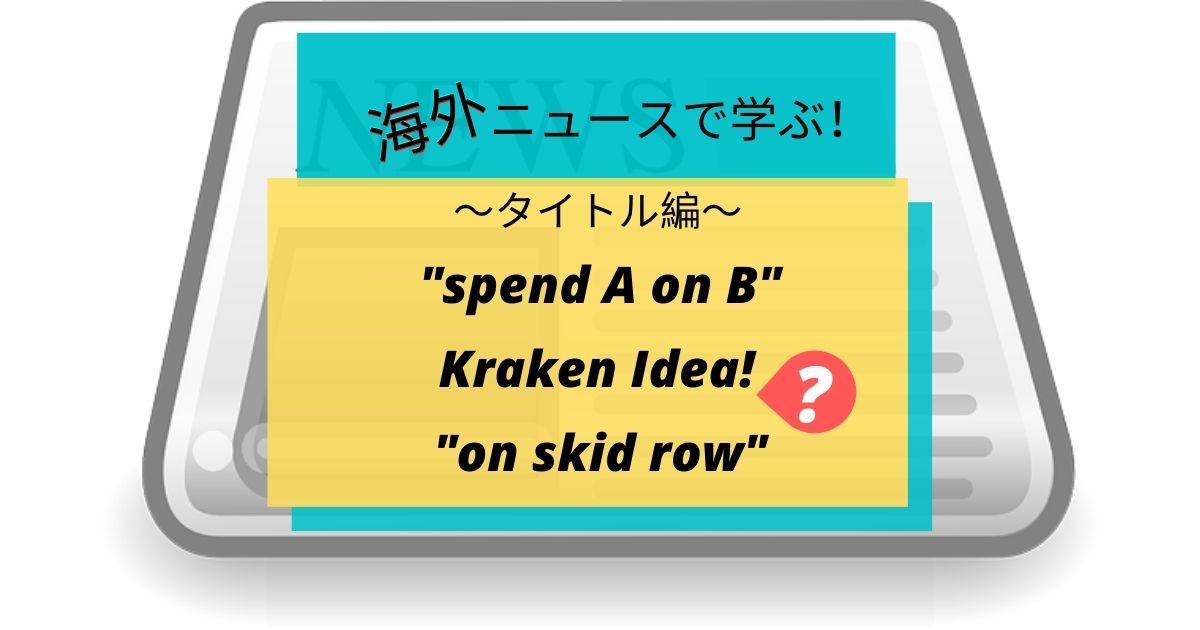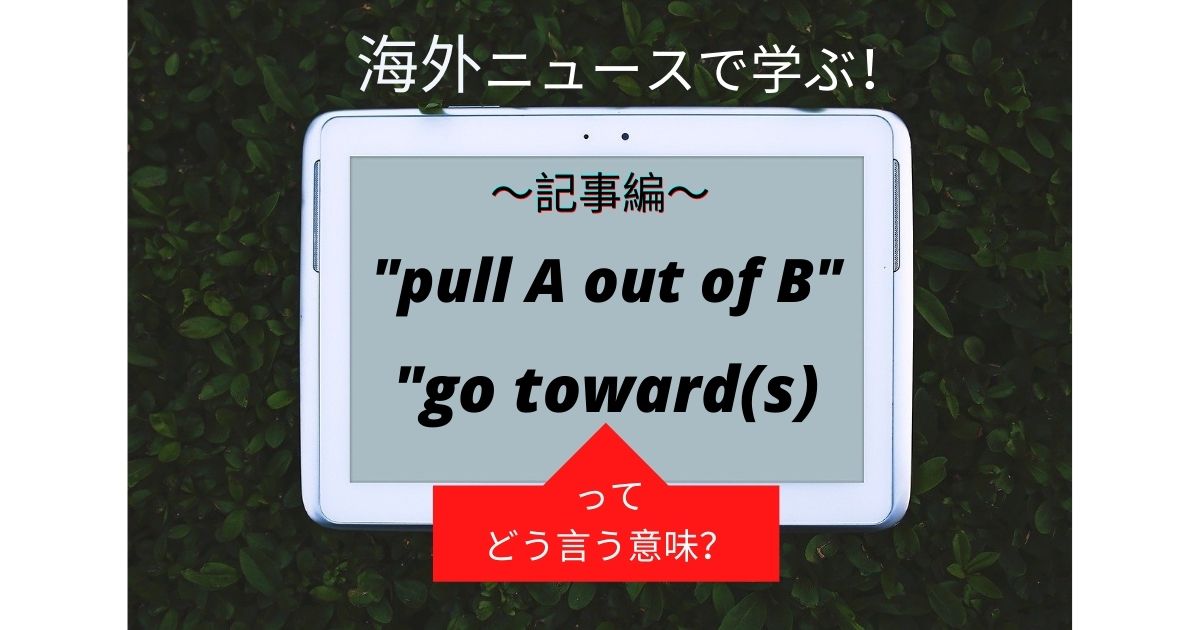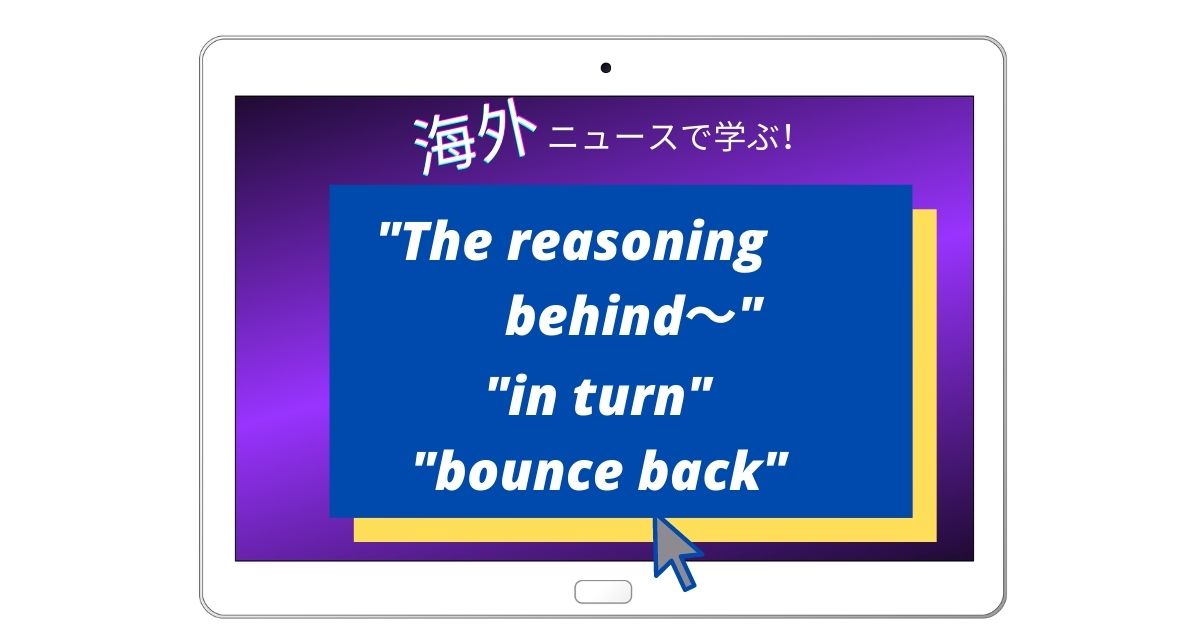引き続き「コロナ交付金で作られた巨大イカ像」の記事から学ぶ熟語の紹介です。
この記事では③番目と④番目の熟語、
③ be spent on 〜
「〜に費やされる」
④ be famous for 所有格+普通名詞
「〜で有名です」
を取り上げます。
”巨大イカ像” 関連記事で
「英語タイトルから学ぶ熟語や比喩表現」の記事はこちらをどうぞ。

前回の記事で紹介した
①pull A out of B
(AをBから救出する、抜け出す)
②go toward(s)〜
(〜に使われる)
の記事はこちらをどうぞ。


それでは早速本文をみていきます。
前回の記事同様、
「Kraken idea : Stimulus cash ends on squid row.」
(訳)モンスター案:景気刺激金は浪費に終わる。
の本文記事を参考にします。

下の記事を読むよ。
最後の文章、ちょっと噛みます。
Noto received some 800 million yen (about $9.4 million) to help ①pull it out of an economic slump.
Part of that money ②went towards building a statue of a giant squid, to display prominently in the town.
Sure, less than $400,000 ③was spent on building the four-metre high statue – but it’s still raised some questions about the ‘best use of government money’.
The town of Noto④ is famous for its flying squid, considered an edible delicacy. So ⑤the reasoning behind the statue is that it’ll be a tourism drawcard and raise the profile of the town’s fishing industry,⑥ in turn helping the area⑦ bounce back economically.
The government funding didn’t have specifics attached to how it must be spent, so Noto has exercised ⑧a bit of a loophole here.
But some people say it’s a fishy exercise.
One local told the area news outlet Chunichi Shimbun the money should have been directed at “urgent relief” like medical staff and long-term care facilities.
“⑨No matter how you look at it, this is wrong. They have to return that money,” one Twitter user said.
Japan is due to host the postponed Olympic Games in July to August.
では熟語③と④を見ていきます。
③ be spent on〜
該当文の音声を再度聞いてみましょう。
be spent on〜の意味:〜に費やされる。

英語タイトル編で紹介しましたが
タイトルに登場したのは
「spend A (お金)on B(物)」でしたね。
“Japanese town Noto spends COVID relief money on giant squid statue.
「AをBに費やす」でした。
(この説明は冒頭で紹介した「英語タイトルから学ぶ熟語の記事」で取り上げています。)
今回の記事本文に登場したのはこの受動態。
Sure, less than $400,000 was spent on building the four-metre high statue.
この文だけ直訳すると、
「(確かに)40万ドル未満の費用が高さ4メートルの像の建設に費やされた。」
となります。
”A (お金)be spent on B(物)”
A(お金)がB(物)に費やされる。
<例文>
More money should be spent on education.
より(もっと)多くのお金が教育に費やされるべきです。
タイトル編でも説明しましたがポイント!
Aには「お金」以外にも「時間」とか「抽象的な物」でも使われます。
I spent a lots of time(or 2hours) on my homework.
He spent his energy on practicing piano.
be spent on と go towardsの違いは?

ここで疑問です。
前の記事で登場した②番目の熟語
Part of that money ②went towards building a statue of a giant squid, to display prominently in the town.
(そのお金の一部は、町で人目を引く展示にするよう巨大イカ像を建てる為に使われました。)
この「go towards〜」も
「(お金が)〜に使われる」って意味でした。
では今回の③番目
Sure, less than $400,000 ③was spent on building the four-metre high statue.
40万ドル未満が高さ4メートルの像の建設に費やされた。
「be spent on〜」の
「(お金)が〜に費やされる」と同じ意味?
どっちも「(お金)が〜に使われる、費やされる」だけど。。。

まぁ同じ意味になるね。
ただ、強いて使われる場面を言うなら
「go towards〜」は
”何かの支払いの足し”
或は
”貢献、援助的”な意味あいで
使うことが多いよ。
例えば
「This money will go towards paying off the debt.」

なるほど。。。
“go towards”の定義を調べてみます。
Definition of go towards: to help pay for (something)(何かの支払いを助けること)My extra income is going towards a new car.(私の副収入は新車の支払いの足しになる。)Your donations will go toward better sanitation for refugees.(あなたの寄付金は難民のより良い衛生状態の助けとなる。)引用:Merriam Webster
:To be a contribution to.(〜の為に貢献すること)Any funds recouped will go towards communities and youth projects.(回収された資金はすべて地域社会や青少年プロジェクトに寄付されます。)引用:Ludwig.guru dictionary

④be famous for 〜(主語の所有格+一般名詞)の例
次に” be famous for〜 “です。
この文では「be famous for 」の直後に
“it” の所有格 “its” を伴ったバージョンが登場!
この所有格を伴うことで
「そこならではの」
と言う強調性が加わります。
ここで使われているitsは主語の能登町のことですね。
例文をあげます。
A is famous for Aの所有格 + 普通名詞.
「Aは(Aの)~で有名です」
<例文>
Osaka is famous for its Takoyaki.
大阪はたこ焼きで有名です。
(たこ焼きが名物です。)
He is famous for his research on herbal medicine.
彼は漢方薬の研究で有名です。
”be famous for〜 ” と ”be famous for 主語の所有格 + 一般名詞〜”の違い
どちらも「〜で有名である」と言う意味ですがその違いは?
前述したようにforの後に所有格を伴うことで
「主語ならではの」と言う強調が加わります。

be famous for 名詞 (固有名詞含む)及び 動名詞
be famous for 所有格 + 一般名詞
:「そこならではの」を強調したい場合
って感じで使い分けるんだ。
例文で習得しよう!
次回は
⑤ the reasoning behind 〜
⑥ in turn
⑦ bounce back
の熟語の使われ方を紹介します。




